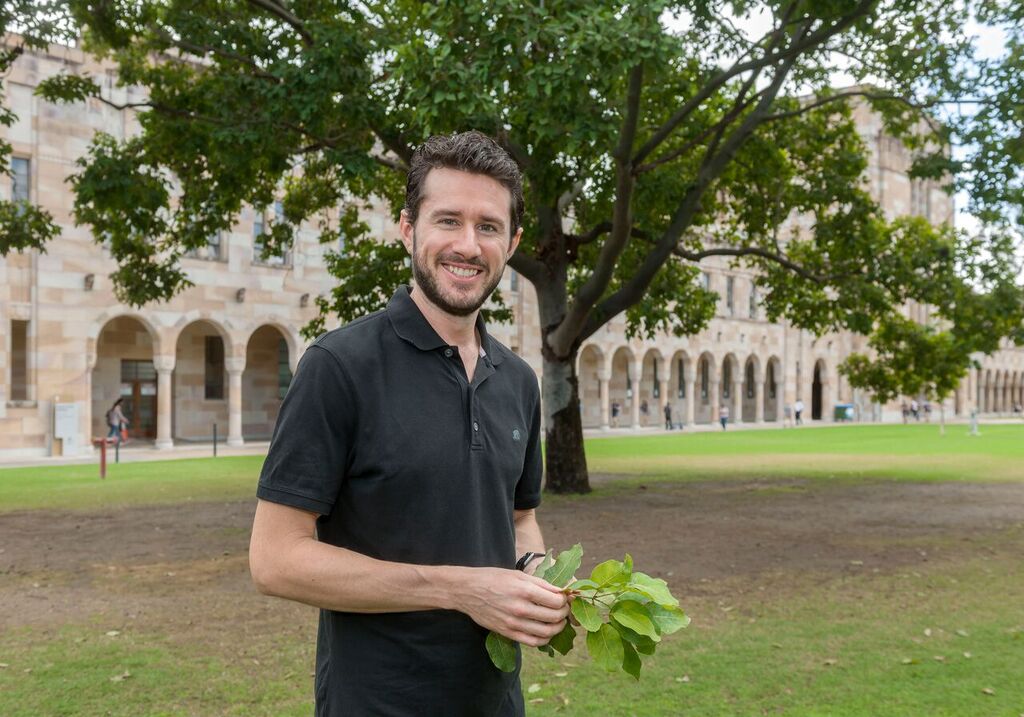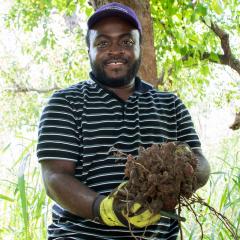“The Corymbia group of Eucalypts are a good amenity tree, planted in South and Central Queensland for its shade properties,” said Mr Healey, a PhD student with QAAFI. “The Corymbia group is a rainforest tree that originates from Northern Queensland, but when it was relocated, it formed spontaneous hybrids with the native ‘spotted gum’ eucalypt.”
The resulting hybrids grow twice as fast as either parent species and combine their desirable
“These hybrids grow well in low nutrient and poor quality soils, so planting them doesn’t compete with agriculture. There are issues involved with using edible feedstocks, such as corn or sugarcane, to produce fuel. The biomass of these trees is mainly composed of polysaccharides, which you can break down into individual sugars and ferment into liquid fuel.”
Once planted, the Corymbia trees can be harvested for decades, as they can re-grow from their own stump after being cut down. A key difference between a biofuel and fossil fuels, is how long it takes to replenish the source of each.
Mr Healey’s PHD project investigates the genetics of trees to find which are well-suited for fuel production, with the goal of creating a new non-edible feedstock for producing biofuels.
“The problem is that trees take a long time to grow, which makes breeding for these biofuel traits more difficult,” Mr Healey said. “By identifying genes responsible for these traits, you can select for trees that will be easier to produce fuel from at a very young age.”
The formation of wood is a complex process that involves the coordination of hundreds of genes.
However, Mr Healey’s research, using next-generation genome sequencing, uncovered mutations in the gene pathways of Corymbia hybrids that were previously unknown, which influence cell wall biosynthesis.
Mr Healey said the eucalypt biofuel research in Australia could help benefit the world – along with eucalypts native to Australia. “The hybrids I have worked on have been deployed overseas because they grow in a wide variety of rainfall conditions, have excellent wood quality and growth characteristics, and resistance to a wide variety to pests and insects,” he said.
Prior to commencing his PhD with QAAFI, Mr Healey worked on biofuel research in Canada for a biofuel company funded by Shell Gasoline. However, when the company pulled out its funding, he began looking for new opportunities. “The work I was doing in Ottawa was on fungal genetics – fungus produce the enzymes that break down plant biomass and my job was trying to figure out how to make them more efficient.” However, after the project funding was pulled, Mr Healey went to work in a pharmaceuticals company working in microbiology. “But it wasn’t research that I was passionate about and I decided to pursue a graduate degree,” he said. It was at this point that sunny Queensland and the Corymbia hybrid trees became part of Mr Healey’s plans.
“Professor Henry and Associate Professor Lee had identified these particular eucalypt hybrids as a potential source for biofuels,” Mr Healey said. “The collaboration with industry and contacts internationally that I was able to access as a student with QAAFI made everything possible.” For his project, Mr Healey sampled around 700 hybrid trees at a plantation near Gympie Queensland.
Thanks to a collaboration between QAAFI and the Joint BioEnergy Institute (JBEI) in Emeryville, California, Mr Healey was able to ship wood samples to JBEI and travel there investigate the biomass composition of these hybrids.
“You take wood shavings from individual trees then analyse what each is composed of,” Mr Healey said, explaining the process. “Then, you sequence the genome of trees of interest and try to find what makes them special.”
This gave him new gene targets to look at – of mutations that occur in less obvious gene pathways that control growth and biomass composition. Professor Henry said QAAFI was a research organisation that developed sustainable technologies, mainly in food-based agriculture. “But we also look at agriculture in supplying non-food products including fuel, and nutritional benefits,” Professor Henry said.
He said it was important to promote consumer awareness of the issues. “Biofuels may play a replacing or fossil fuels for airline fuels, for example, and could also replace oil for non-fuel products like plastics and various materials.”



